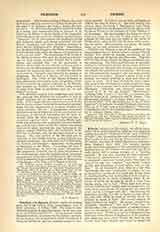

Friedrich von Hausen (HUSEN), medieval German poet, one of the earliest of the minnesingers; date of birth unknown; d. May 6, 1190. His name is mentioned frequently in legal documents, for the first time in one from Mainz dated 1171. He was born in middle Rhenish territory, as is shown by his dialect, especially by his rhymes, but several towns claim the honor of being his birthplace, and the question cannot be defi-nitely decided. In 1175 he was in Italy, and again in 1186 in the suite of Henry VI. The next year he was present when Frederick I (Barbarossa) and Philip Augustus met between Mouzon and Yvois, and in 1188 he was at Worms in the company of Count Baldwin V of Hennegau. He accompanied the Emperor Frederick, by whom he was held in high esteem, on the crusade of 1189, and met his death at the battle of Philomelium, when he fell with his horse while pursuing the enemy. His popularity was great; the whole army, we are told, mourned his death.
Friedrich von Hausen is one of the earliest of the minnesingers who are known to have imitated French models, with which he became acquainted on his travels through Burgundy and Provence. Together with Veldeke he introduced the Romance element into the minnesong. The Provencal influence is especially evident in the dactylic rhythm of his verses, which resulted from the adoption into German of a Romance ten-syllable line with four or five stresses. His rhymes are still occasionally imperfect and his songs contain more than one strophe. Hausen’s poetry is not at all popular, but rather artificial in form and often abstruse in spirit. He is fond of dallying with a word. Like most of the troubadours or minnesingers he sings chiefly of love’s pangs, but he never degenerates into effeminacy. Friedrich von Hausen’s poems are printed in F. H. von der Hagen’s “Minnesinger” (Leipzig, 1838, 4 vols.), I, 212-217; a selection may also be found in K. Lachmann and M. Haupt, “Des Minnesangs Fruhling” (Leipzig, 1888), 42 sqq.; in Friedrich Pfaff, “Der Minnesang des 12 bis 14 Jahrhunderts” (Ktirschners Deutsche National-Litteratur, VIII, pt. I, 17-24); and in Karl Bartsch, “Deutsche Liederdichter des 12 bis 14 Jahrhunderts” (4th edition, by W. Golther, Berlin, 1901).
ARTHUR F. J. REMY

